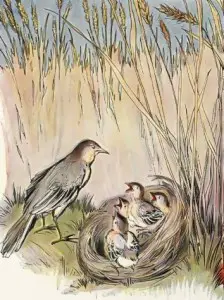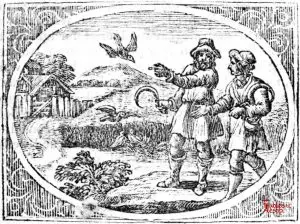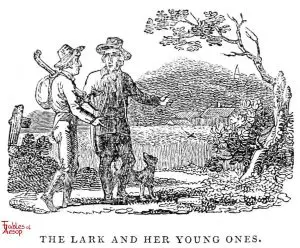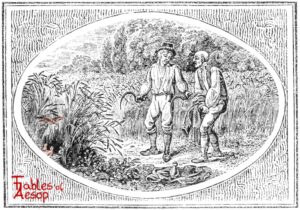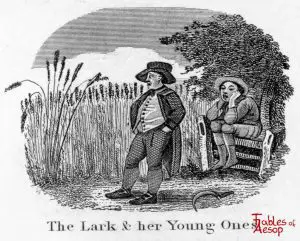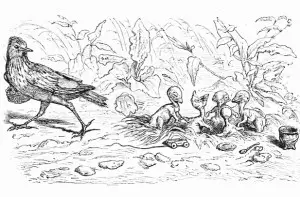A Lark’s young ones wanted to know when to leave the field they were in. The mother said when the owner hires workers instead of trying to do it himself.
Self-help is the best help.

Aesop For Children
A Lark made her nest in a field of young wheat. As the days passed, the wheat stalks grew tall and the young birds, too, grew in strength. Then one day, when the ripe golden grain waved in the breeze, the Farmer and his son came into the field.
“This wheat is now ready for reaping,” said the Farmer. “We must call in our neighbors and friends to help us harvest it.”
The young Larks in their nest close by were much frightened, for they knew they would be in great danger if they did not leave the nest before the reapers came. When the Mother Lark returned with food for them, they told her what they had heard.
“Do not be frightened, children,” said the Mother Lark. “If the Farmer said he would call in his neighbors and friends to help him do his work, this wheat will not be reaped for a while yet.”
A few days later, the wheat was so ripe, that when the wind shook the stalks, a hail of wheat grains came rustling down on the young Larks’ heads.
“If this wheat is not harvested at once,” said the Farmer, “we shall lose half the crop. We cannot wait any longer for help from our friends. Tomorrow we must set to work, ourselves.”
When the young Larks told their mother what they had heard that day, she said:
“Then we must be off at once. When a man decides to do his own work and not depend on any one else, then you may be sure there will be no more delay.”
There was much fluttering and trying out of wings that afternoon, and at sunrise next day, when the Farmer and his son cut down the grain, they found an empty nest.
Moral
Self-help is the best help.

Townsend version
A lark had made her nest in the early spring on the young green wheat. The brood had almost grown to their full strength and attained the use of their wings and the full plumage of their feathers, when the owner of the field, looking over his ripe crop, said, “The time has come when I must ask all my neighbors to help me with my harvest.” One of the young Larks heard his speech and related it to his mother, inquiring of her to what place they should move for safety. “There is no occasion to move yet, my son,” she replied; “the man who only sends to his friends to help him with his harvest is not really in earnest.” The owner of the field came again a few days later and saw the wheat shedding the grain from excess of ripeness. He said, “I will come myself tomorrow with my laborers, and with as many reapers as I can hire, and will get in the harvest.” The Lark on hearing these words said to her brood, “It is time now to be off, my little ones, for the man is in earnest this time; he no longer trusts his friends, but will reap the field himself.”
Moral
Self-help is the best help.

Samuel Croxall
A LARK, who had young ones in a field of corn which was almost ripe, was under some fear lest the reapers should come to reap it before her young brood was fledged, and able to remove from the place. Wherefore, upon flying abroad to look for food, she left this charge with them: That they should take notice what they heard talked of iu her absence, and tell her of it when she came back, again. When she was gone, they heard the owner of the corn call to his son: Well, says he, I think this corn is ripe enough; I have you go early to-morrow, and desire our friends and neighbours to come and help us to reap it. When the old Lark came home, the young ones fell a quivering and chirping round her, and told her what had happened, begging her to remove them as fast as she could. The mother bid them be easy; for, says she, if the owner depends upon his friends and neighbours, I am pretty sure the corn will not be reaped to-morrow. Next day, she went out again, upon the same occasion, and left the same orders with them as before. The owner came, and staid, expecting those he had sent to: but the sun grow hot, and nothing was done, for not a soul came to help him. Then,says he, to his son, I perceive these friends of ours are not to be depended upon, so that you must even go to your uncles and cousins, and tell them I desire they would be here betimes to-morrow morning to help us to reap. Well, this the young ones, in a great fright, reported also to their mother. If that be all, says she, do not be frightened, children, for kindred and relations do not use to be so very forward to serve one another: but take particular notice what you hear said the next time, and be sure you let me know it. She went abroad the next day, as usual; and the owner, finding his relations as slack as the rest of his neighbours, said to his son, Harkee, George, do you get a couple of good sickles ready against to-morrow morning, and we will even reap the corn ourselves. When the young ones told their mother this, Then says she, we must be gone indeed; for when a man undertakes to do his business himself, it is not so likely that he will be disappointed. So she removed her young ones immediately, and the corn was reaped the next day by the good man aad his son.
THE APPLICATION
Never depend upon the assistance of friends and relations in anything which you are able to do yourself; for nothing is more fickle and uncertain. The man who relies upon another for the execution of any affair of importance, is not only kept in a wretched and slavish suspense, while he expects the issue of the matter, but generally meets with a disappointment. While he who lays the chief stress of his business upon himself, and depends upon his own industry and attention for the success of his affairs, is in the fairest way to attain his end: and, if at last he should miscarry, has this to comfort him, that it was not through his own negligence and a vain expectation of the assistance of friends. To stand by ourselves, as much as possible to exert our own strength and vigilance in the prosecution of our affairs is godlike, being the result of a most noble and highly exalted reason; but they who procrastinate and defer the business of life by an idle dependence upon others, in things which it is in their own power to effect, sink down into a kind of stupid and abject slavery, and show themselves unworthy of talents with which human nature is dignified.

Thomas Bewick
A Lark who had Young Ones in a field of corn nearly ripe, was under some fear lest the reapers should come and cut it down before her young brood were fledged, and able to remove from the place; wherefore, when she flew abroad in the morning to seek for food for them, she charged them to listen to what the Farmer said about shearing. On her return, her young family opened all their little throats at once, to inform her that the Farmer had sent to his neighbours to reap the corn the next morning. Is that all? said the old Lark, then there is no danger. When she went abroad again the next morning, she left the same instructions as before. At night, she found her Young Ones more alarmed than at first; for the Farmer had applied to his friends, earnestly requesting them to begin the harvest the next day. She received this intelligence as calmly as before, and took no other precautions the next day, than repeating the same orders. In the evening, they told her that the Farmer had been charging his son to get the sickles ready, for it was in vain to wait for other people, and that they would cut the corn to-morrow themselves. Nay, then said the old Lark, we must be off as soon as we can; for when a man undertakes to do his business himself, it is not so likely that he will be disappointed.
APPLICATION
He who depends on the assistance of others to perform what he is able to do himself, must not be surprised to find that his business is neglected. He may be sure that it will be best done when he puts forth his own hands, and looks after it with his own eyes. How indeed can any man imagine, that other people will be active in his interest, while he himself remains indolent and unconcerned about his own affairs. Men of such tempers and dispositions, live in a state of suspense, and subject themselves to perpetual disappointments and losses, which their own industry would have prevented, and have kept their minds at ease. They do not use their reasoning powers, but sink down into a kind of stupid abject dependence upon others, which degrades even the finest talents with which human nature is dignified.

Jefferys Taylor
A LARK who had her nest conceal’d,
Says Aesop, in a barley field;
Began, as harvest time drew near,
The reaping of the corn to fear:
Afraid they would her nest descry,
Before her tender brood could fly.
She charged them therefore every day,
Before for food she flew away,
To watch the farmer in her stead,
And listen well to all he said.
It chanced one day, she scarce was gone
Ere came the fanner and his son.
The farmer well his field survey’d,
And sundry observations made;
At last, “I’ll tell you what,” said he,
“This corn is fit to cut, I see;
But we our neighbours’ help must borrow,
So tell them we begin to-morrow.”
Just after this the lark return’d,
When from her brood this news she learn’d.
“Ah! dearest mother,” then said they,
“Pray let us all be gone to-day.”
“My dears,” said she, “you need not fret;
I shall not be uneasy yet;
For if he waits for neighbours’ aid,
The business long will be delay’d.”
At dawn she left her nest once more,
And charged her young ones as before.
At five the farmer came again,
And waited for his friends in vain.
“Well,” said the man, “I fancy, son,
These friends we can’t depend upon;
To-morrow early mind you go,
And let our own relations know.”
Again the lark approach’d her nest,
When round her all her young one’s prest,
And told their mother, word for word,
The fresh intelligence they’d heard.
“Ah! children, be at ease,” said she;
“We’re safe another day, I see;
For these relations, you will find,
Just like his friends, will stay behind.”
At dawn again the lark withdrew,
And did again her charge renew.
Once more the farmer early came,
And found the case was just the same;
The day advanced, the sun was high;
But not a single help drew nigh.
Then said the farmer, “Hark-ye, son—
I see this job will not be done
While thus we wait for friends and neighbours;
So you and I’ll commence our labours:
To-morrow early we’ll begin
Ourselves, and get our harvest in.”
“Now,” said the lark, when this she’d heard,
“Our movement must not be deferr’d;
For if the farmer and his son
Themselves begin, ’twill soon be done.”
The morrow proved the lark was right;
For all was cut and housed by night.
Hence, while we wait for others’ aid,
Our business needs must be delay’d;
Which might be done with half the labour
‘T would take to go and call a neighbour.

JBR Collection
A Lark, who had Young Ones in a field of corn which was almost ripe, was afraid lest the reapers should come before her young brood were fledged. Every day, therefore, when she flew away to look for food, she charged them to take notice of what they heard in her absence, and to tell her of it when she returned. One day when she was gone, they heard the master of the field say to his son that the corn seemed ripe enough to be cut, and tell him to go early tomorrow and desire their friends and neighbours to come and help to reap it. When the old Lark came home, the Little Ones fell quivering and chirping around her, and told her what had happened, begging her to remove them as fast as she could. The mother bade them to be easy, “for,” said she, “if he depends upon his friends and his neighbours, I am sure the corn will not be reaped tomorrow.” Next day she went out again, and left the same orders as before. The owner came, and waited. The sun grew hot, but nothing was done, for not a soul came. “You see,” said he to his son, “these friends of ours are not to be depended upon, so run off at once to your uncles and cousins, and say I wish them to come betimes to-morrow morning and help us to reap.” This the Young Ones, in a great fright, reported also to their mother.” Do not be frightened, children,” said she; “kindred and relations are not always very forward in helping one another; but keep your cars open, and let me know what you hear to-morrow.” The owner came the next day, and, find ing his relations as backward as his neighbours, said to his son., “Now, George, listen to me. Get a couple of good sickles ready against to-morrow morning, for it seems we must reap the corn by ourselves.” The Young Ones told this to their mother. “Then, my dears,” said she, “it is time for us to go indeed, for when a man undertakes to do his business himself, it is not so likely that he will be disappointed.” She removed her Young Ones immediately, and the corn was reaped the next day by the old man and his son.

L’Estrange version
There was a brood of young larks in the corn, and the dam, when she went abroad to forage for them, laid a strict charge upon her little ones, to pick up what news they could get against she came back again. They told her at her return, that the owner of the field had been there, and order’d his neighbours to come and reap the corn. Well, says the old one, ther’s no danger yet then. They told her the next day that he had been there again, and desir’d his friends to do’t. Well, well, says she, there’s no hurt in that neither, and so she went out a progging for provisions again as before. But upon the third day, when they told their mother, that the master and his son appointed to come the next morning about it themselves: nay then, says she, ’tis time to look about us: as for the neighbours and the friends, I fear ’em not: but the master I’m sure will be as good as his word; for ’tis his own bus’ness.
Moral
He that would be sure to have his bus’ness well done, must either do it himself, or see the doing of it; beside that many a good servant is spoil’d by a careless master.

Alauda, Pulli, et Agri Dominus
Alauda positos in segete pullos monet ut, dum ipsa abest, diligenter attendant praetereuntium sermones de messe. Redit a pastu mater. Pulli anxii narrant dominum agri operam illam mandasse vicinis. Respondet nihil esse periculi. Item, alio die, trepidi aiunt rogatos ad metendum esse amicos. Iubet iterum illa ut sint securi. Tertio, ut audivit ipsum dominum cum filio statuisse postremo mane cum falce messem intrare, “Iam,” inquit, “est tempus ut fugiamus. Dominum enim agri timeo, quia probe scio quod illi res cordi est.”
Perry #325
